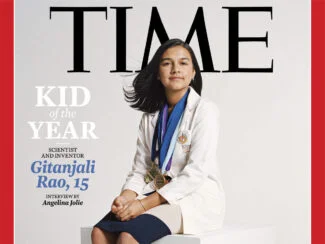Prodigy literally means an amazing thing, especially one out of the ordinary course of nature. In other words, something that leaves you awestruck and dazed for hours. That’s how we can describe Gitanjali Rao, TIME’s Kid of the Year recipient for 2020.
The 15-year-old Indian- American scientist is the brain behind 6 inventions and has also paved her way from America’s top young scientist award as well as made her mark in the Forbes 2019’s 30 under 30 lists. This is her story.
Let’s talk science
Drinking water is a fundamental right of any human being. We cannot survive without it. 2014 initiated the Flint water crisis where the resident’s health was put at risk for high levels of lead in their drinking water. The then 7th grader Rao took note and embarked on the journey of innovation. The device was called the Tethys and it could detect the lead compound in water sending the values of the water status- ‘safe’, ‘slightly contaminated’ or ‘critical’ to a smartphone app she created alongside. The invention won her the 2017 Discovery Education 3M Young Scientist Challenge.
Gitanjali Rao according to some could be categorised as a nerd but that would be incomplete. She was a nerd but with a pragmatic approach. She saw an issue and worked against it.
Her next invention was motivated by the dire need to hit the conscience of cyberbullies with Kindly, an app and a Chrome extension that can detect cyberbullying at an early stage.
In her interview, she quotes, “I started to hard-code in some words that could be considered bullying, and then my engine took those words and identified words that are similar. You type in a word or phrase, and it’s able to pick it up if it’s bullying, and it gives you the option to edit it or send it the way it is”. The app gives you a chance to rethink your choice of words initiating the trail of thought that your conscious leads.
Another invention is a device called Epione that physicians can use to tell if their patients are at the onset of addiction. Opioid-related overdoses killed more than 47,000 people in the US in 2017, the same year that opioids were responsible for about two-thirds of all drug-related deaths globally. The crisis darkens further as we understand that only 1 in 7 people with opioid abuse disorders receive the help they need. With Epione in the picture, this AI-powered medical device helps diagnose opioid addiction at an early stage.
What a daily life looks like for a 15-year-old scientist
In Rao’s interview with TIME magazine, she said,” I spend more time doing 15-year-old things during the quarantine. I baked an ungodly amount. It’s not good, but it’s baking. And, like, it’s science too… To be fair, most of the time we don’t have eggs at home, or like flour, so I have to go online and search eggless, flourless, sugarless cookies, and then I try to make that. I made bread recently and it was good, so I’m proud of myself.”
The innovator is also adept in playing the piano, swimming, fencing and Indian Classical dancing and singing. At the age of 9, she began to learn classical music.
“If I can do it so can you”
Pragmatism is a gift that needs the push of focus and concentration. She encourages young people to take on one problem at a time. Keeping her own work as a testimony for all that anyone can achieve by taking inspiration from their own problem.
Rao works with schools, girls in STEM organisations, Shanghai International Youth Science and Technology group and the Royal Academy of Engineering in London. Moreover, she conducts weekly sessions and workshops that have expanded to more than 28,000 elementary, middle and high school students globally. In her interview with CNN, she highlighted the importance of right mentorship and how to guide educators across the globe to mould the scientific brains of those, much like hers think outside the box.
What makes Gitanjali Rao the best role model for our students is not just her research or the fact that she can invent things that we at her age would only dream of. She is after all just a kid. But a kid who knows how to direct her out of the box thinking into actual working solutions and making history.


